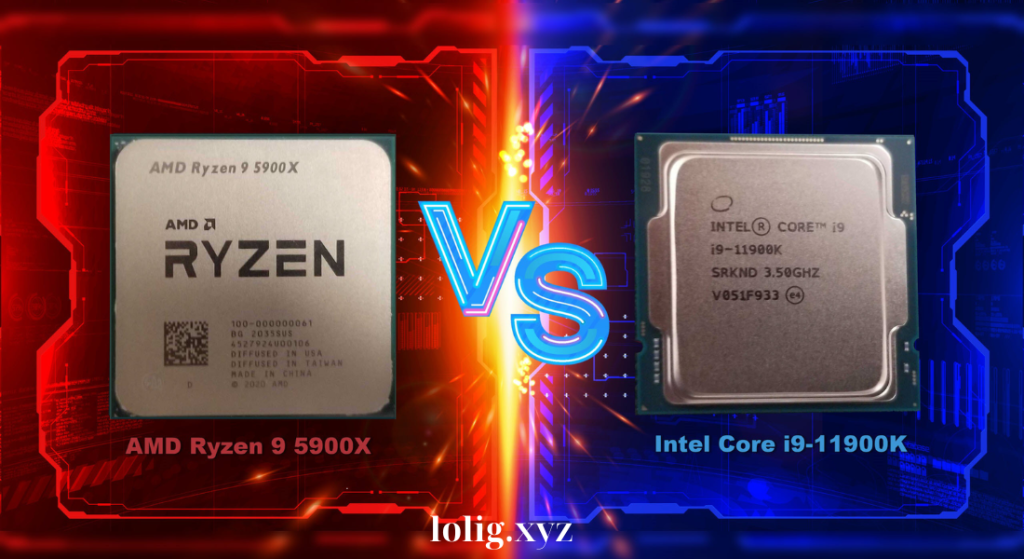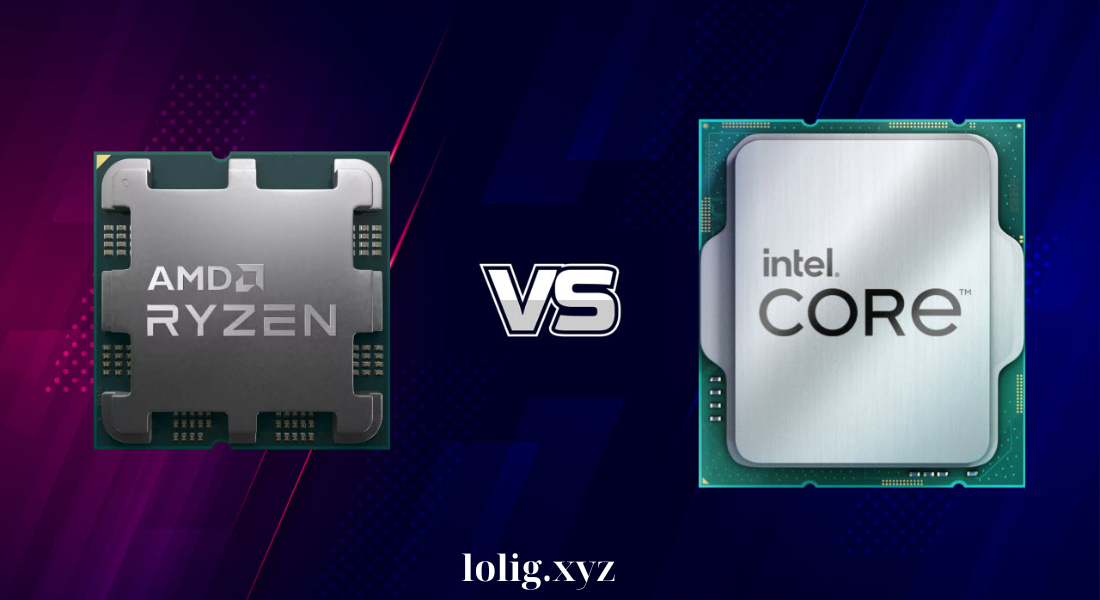The release of AMD’s Ryzen 9 7950X and Intel’s i9-13900K has set a new standard in the high-performance CPU market, sparking intense debates among gamers, content creators, and professionals. Built with cutting-edge architecture—AMD’s Zen 4 and Intel’s Raptor Lake—both processors promise exceptional speed, power, and efficiency. But in the showdown of Ryzen 9 7950X vs. Intel i9-13900K, which CPU truly stands out? This article will take a detailed look at the specs, gaming and productivity performance, power consumption, compatibility, and value for money of each processor to help you choose the right one for your needs.
1. Specifications Comparison: Ryzen 9 7950X vs. Intel i9-13900K

Understanding the core specifications is essential in comparing Ryzen 9 7950X vs. Intel i9-13900K. Here’s what each CPU brings to the table:
- Core and Thread Count: The Ryzen 9 7950X has 16 cores and 32 threads, focused on performance. In contrast, the Intel i9-13900K features 24 cores split into 8 performance cores and 16 efficiency cores, also with 32 threads. Intel’s hybrid core architecture offers a balance of power and efficiency, giving it an edge in multi-functional tasks.
- Clock Speeds: The i9-13900K boasts a base clock of 3.0 GHz, turboing up to 5.8 GHz on the performance cores. The Ryzen 9 7950X, on the other hand, has a base clock of 4.5 GHz and a boost clock reaching 5.7 GHz. While both CPUs reach impressive speeds, Intel’s peak boost is slightly higher, which can impact single-threaded tasks.
- Cache Size: AMD’s Ryzen 9 7950X features a total cache of 80 MB, compared to Intel’s 36 MB. The larger cache size in the Ryzen 9 7950X can improve data access speeds, especially for memory-intensive applications.
2. Gaming Performance: Ryzen 9 7950X vs. Intel i9-13900K
When it comes to gaming, both CPUs deliver outstanding performance, but each has unique strengths:
- Single-Threaded Performance: Many games rely heavily on single-threaded performance, where Intel’s i9-13900K shines due to its higher boost clock. As a result, gamers looking to squeeze out maximum frame rates might see a slight edge with Intel’s processor, especially in CPU-bound games.
- Multitasking in Gaming: AMD’s Ryzen 9 7950X offers consistent performance across its 16 cores, making it highly effective for gaming while running other tasks like streaming or video recording. In the Ryzen 9 7950X vs. Intel i9-13900K comparison, the Ryzen 9 7950X may be preferable for gamers who frequently multitask.
- 4K Gaming: At higher resolutions like 4K, the GPU generally takes on most of the processing load, minimizing CPU impact. Here, the differences in Ryzen 9 7950X vs. Intel i9-13900K become negligible, as both processors are more than capable of handling such tasks.
3. Productivity and Content Creation: Ryzen 9 7950X vs. Intel i9-13900K
For content creators, the Ryzen 9 7950X vs. Intel i9-13900K comparison is a bit more nuanced, depending on specific productivity requirements.
- Rendering and 3D Modeling: AMD’s Ryzen 9 7950X, with its 16 high-performance cores, excels in rendering, 3D modeling, and other multi-threaded workloads. Its design makes it ideal for applications like Blender, Autodesk Maya, and other software that leverages multiple cores.
- Video Editing and Encoding: The Ryzen 9 7950X vs. Intel i9-13900K comparison in video editing software shows impressive performance for both. Intel’s i9-13900K, with its hybrid core architecture, handles multi-tasking efficiently, while AMD’s larger core count provides faster rendering in video projects.
- AI and Machine Learning: While neither CPU is specifically built for AI tasks, Intel’s hybrid architecture in the i9-13900K, combined with high clock speeds, can handle light machine learning workloads. However, Ryzen’s large cache size can provide an edge in data-intensive applications.
4. Power Consumption and Thermal Efficiency
Power efficiency and thermal management are critical factors for these high-performance CPUs. Here’s how Ryzen 9 7950X vs. Intel i9-13900K compare in this regard:
- Power Consumption: The Ryzen 9 7950X operates at a base TDP of 170W, while Intel’s i9-13900K has a base power of 125W but can reach up to 253W under heavy loads. Intel’s hybrid architecture allows for better scaling in power usage but results in higher peak power consumption when pushed to max performance.
- Thermal Management: With higher power consumption comes higher heat output. Both CPUs benefit from robust cooling solutions, and users may want to consider liquid cooling for optimal performance. Intel’s i9-13900K can experience higher temperatures under turbo loads, while AMD’s Ryzen 9 7950X maintains relatively stable temperatures even under prolonged use.
- Longevity and Efficiency: In terms of long-term efficiency, the Ryzen 9 7950X has an edge due to its steadier power consumption. This makes it potentially more cost-effective for users who run intensive workloads over extended periods.
5. Compatibility and Future Upgrade Paths
Compatibility and upgrade potential are essential considerations in the Ryzen 9 7950X vs. Intel i9-13900K comparison:
- Motherboard Compatibility: AMD’s Ryzen 9 7950X uses the new AM5 socket, marking a fresh platform with potential future support. The Intel i9-13900K operates on the LGA 1700 socket, which is compatible with 12th and 13th Gen Intel CPUs but may not support future generations.
- Memory Support: Both CPUs support DDR5 memory, though the i9-13900K is also compatible with DDR4, offering flexibility for users on a budget. The Ryzen 9 7950X’s exclusive support for DDR5 provides better future-proofing as DDR5 becomes the industry standard.
6. Value for Money
The value proposition is a significant factor in deciding between Ryzen 9 7950X vs. Intel i9-13900K. Here’s a breakdown:
- Price Comparison: Both processors are positioned in the premium market, with slight regional price differences. For users focused on raw multi-core performance, the Ryzen 9 7950X generally offers better value, while Intel’s i9-13900K can provide strong single-threaded performance for less, making it attractive to gamers.
- Performance Per Dollar: For gaming, the i9-13900K provides slightly better performance per dollar due to its single-threaded capabilities. However, for productivity tasks, AMD’s Ryzen 9 7950X is a strong choice for those needing powerful multi-core capabilities at a competitive price.
7. Final Verdict: Ryzen 9 7950X vs. Intel i9-13900K
Both the Ryzen 9 7950X vs. Intel i9-13900K bring distinct advantages, but the ideal choice depends on the user’s needs:
- For Gamers: Intel’s i9-13900K, with its high single-core speed and flexible memory options, is a top choice for gaming-focused users. Its hybrid core design is excellent for users who balance gaming with lighter multitasking.
- For Content Creators and Professionals: AMD’s Ryzen 9 7950X, with its 16 high-performance cores and larger cache, is better suited for heavy multi-threaded workloads. It’s an ideal choice for professionals in video editing, 3D modeling, and rendering.
- For Future Compatibility: Users interested in a longer-term upgrade path may prefer AMD’s AM5 platform for potential future CPU support. However, Intel’s LGA 1700 socket remains highly compatible with current-gen components, making it a stable choice.
Conclusion
The Ryzen 9 7950X vs. Intel i9-13900K comparison highlights two high-performance CPUs tailored to different audiences. Intel’s i9-13900K stands out for gamers and general users seeking high-speed performance, while AMD’s Ryzen 9 7950X shines for content creators and professionals needing powerful multi-core processing. Whether you’re building a gaming rig or a workstation, either processor offers cutting-edge performance, allowing you to elevate your computing experience with confidence. As AMD and Intel continue innovating, this rivalry drives exceptional choices, ensuring whichever CPU you choose, you’ll get a powerhouse.
